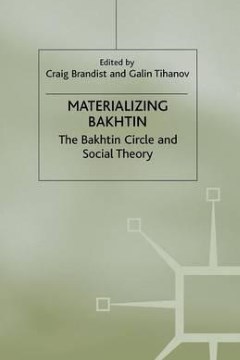Repository | Book | Chapter

(2000) Materializing Bakhtin, Dordrecht, Springer.
The main problem with globalization is not only the nefarious economic system it represents, but also that it lacks a coherent or logical basis for its apprehension. Within the time/space compression of the moment, with all the presentist tendencies of postmodernity, and with all the loud trumpeting that because of technological and economic integration the world is a smaller place, there is relatively little discussion about how globalization can be understood without expounding on some cognitive, imaginative or sensate means to do so.1 The ever-laconic Spectator noted in 1962 that "globalization is, indeed, a staggering concept" and so it has turned out to be. How does one address a concept that does not appear to be one? Of course, culture is the primary means through which we currently understand globalization (we may qualify that to technologies of culture for those who wish to include McLuhan's model of the global village) but it is not its essence, its primum mobile. Indeed, what is staggering about culture in this instance is not its irrefutable difference but its consummate inability to provide a transformative knowledge of the primary motor of globalization. Globalization does not offer up this knowledge with the ease of a Lonely Planet guide, or even with the electronic certitude of the information superhighway, precisely because it is grounded in a cognitive and epistemological impasse: there is no order of thought identical with the process of globalization as currently construed, no language adequate to the universalizing totality it is held to express, no subject that could embody the post-human manifestations of its reach, no culture that could fully come to terms with the non-representational excess of its Being.
Publication details
Full citation:
Hitchcock, P. (2000)., The world according to globalization and Bakhtin, in C. Brandist & G. Tihanov (eds.), Materializing Bakhtin, Dordrecht, Springer, pp. 3-19.
This document is unfortunately not available for download at the moment.



